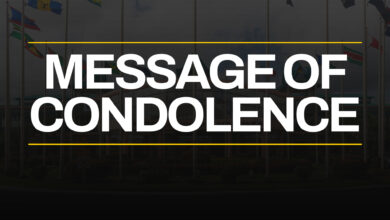(Caribbean Community Secretariat, Turkeyen, Greater Georgetown, Guyana) Good morning. Honourable Freundel Stuart, Prime Minister of Barbados.
Your Excellency Desiré Delano Bouterse, President of Suriname and Chairman of the Conference of Heads of Government of the Caribbean Community.
Your Excellency Irwin LaRocque, Secretary General of CARICOM.
Distinguished special guests.
Esteemed Heads of State and Government of the Caribbean Community.
Ladies and gentlemen.
It is an honour for me, and for the Mexican people I represent, to be present here at this second Mexico -Caribbean Community Summit, CARICOM.
I am most grateful to the people and Government of Barbados for their kind hospitality. Because of our historical ties, Mexico has a close, long-standing friendship with the nations of the Caribbean.
The Caribbean is also Mexico’s third border; it is a region with which we share a common destiny and the desire to increase our respective nations’ prosperity.
In addition to our historical ties, our deep friendship, and our common destiny and hopes, we also share the Caribbean Sea. We are also a part of the Caribbean Community, even though we are not formally a part of CARICOM.
This is why I feel very positive about this meeting. This is the first Summit in which Mexico participates on foreign soil, although it is the second Summit that we take part in. The first was held in the Mexican Caribbean in 2010, when we launched the Community of Latin American and Caribbean States, the CELAC that – and here I agree with Prime Minister Stuart – should in no way substitute, replace or eliminate other international organizations, of which we are all proud to be members.
I know that we will continue to take very firm steps to further extend the cooperation between our countries, for it is only through greater cooperation that we will be able to advance economic development and overcome our common challenges.
I would like to share some of my thoughts on those challenges.
First, cooperation for development, which is fundamental. We must promote the exchange of experiences in key areas to increase the competitiveness of our economies and to provide employment for our people, especially the young.
For this reason, it is essential we understand each other, that we collaborate and share experiences in areas such as tourism, trade facilitation, transportation and port modernization.
And that is why Mexico has entered into projects with Central America on these issues, and I am sure that through dialogue here at this Summit, and by Mexico and the Caribbean countries working together, we will be able to implement creative initiatives that will enable us to grow economically and create the jobs we so badly need.
Second, organized crime is a threat to the region’s development, and we must face this issue in an organized manner. This is a transnational activity that affects all our countries, and will require us to all work together in order to face this challenge.
That is why I appreciate the unanimous support Mexico received at the Summit of the Americas, in Cartagena, Colombia, when our proposal to create a hemispheric system to fight transnational organized crime was approved.
I would like to invite you to make a joint effort to advance the implementation of this system, for it is clear that we cannot be disorganized when facing the challenge of organized crime.
We have to organize ourselves, and combine our strength to confront those who attack what we hold most dear – the security, the lives and the freedom of our citizens.
Thirdly, I would like to tell you that Mexico has shown and will continue to show a firm commitment to rebuilding Haiti. Last month I visited that beloved Caribbean country and supervised several projects such as the building of clinics, schools, and hospitals that were financed and run by the people and government of Mexico.
Today, I would like to emphasize Mexico’s commitment to continue to support the reconstruction efforts in Haiti. I am glad that at this Summit we will be speaking of the challenges and the work that still needs to be done in our sister nation, especially in matters relating to health and education, but also in matters of infrastructure development, potable water and other vital needs of the Haitian people.
Fourthly, in order to increase our prosperity, it is essential that we strengthen our trade and investment relations. Trade between CARICOM countries and Mexico has more than tripled over the past ten years, which is great progress, but it still only represents 3 percent of Mexico’s overall trade with Latin America and the Caribbean.
The purpose of being here today is precisely to strengthen the trade between Mexico and the Caribbean community. We must take advantage of our great potential, because I am convinced that free trade is a powerful tool that can help to increase growth and development, especially during these particularly difficult times for the world economy.
I am convinced that if the world – both developed and developing nations – want to find a feasible way out of the recession currently affecting so many countries around the world, if we want stable growth, I believe the road to take is that of increased trade, not less trade… of increased global investment, not less global investment.
As the Prime Minister said, Mexico currently occupies the Presidency of the G20, the first time by a developing country in the Americas.
The first priority on the Mexican agenda is, precisely, to establish measures to bring about economic stability and create growth, and to put an end to this crisis.
A key action to this end, again, is to facilitate the flow of trade. History shows that protectionism and nationalization is the wrong response to a crisis of this kind.
I am convinced that greater openness, more trade and increased investment, will enable our economies to grow and generate the jobs that our people demand.
The Mexican G20 Presidency does not intend to replace international organizations, but to guide and promote the processes undertaken in those organizations. We consider it a fundamental platform for dialogue, analysis and proposals that will allow peoples and governments to understand their mutual problems and to find their solutions.
Specifically, under Mexico’s G20 Presidency, we have put together an ambitious agenda for development. The present economic crisis will not be the only topic, nor is it likely to be the main concern on the agenda. We expect to discuss long-term plans for sustainable, balanced growth in the future.
As a result, in the talks prior to the actual Summit meeting, we have included more subjects on development than have been discussed at any other Summit.
The current world financial crisis is on the agenda, but we have also included economic development of poor countries.
The restructuring of international financial institutions is part of the agenda; but we have also included, the topic of financial inclusion for the world’s poorest families, who are not eligible for loans or credit and whose future looks very bleak.
We have included topics regarding the economic balance between nations; but we have also included food security, knowing that the poorest people in the world, millions of which live in our countries, have suffered from severely harsh food price increases for years.
As per all our previous discussions, we are insisting on having such issues as infrastructure and green growth included on the agenda.
Another characteristic of the Mexican G20 agenda is the attempt to make the consulting process more inclusive. As President of the G20, Mexico has gone to great lengths to incorporate the opinions of all countries, particularly those of developing nations, through dialogue undertaken with non-member countries, a case in point being the CARICOM.
We have also invited Chile, as the President of the CILAC, to take part in the G20 Summit.
For Mexico, it is very important to hear the perspectives of developing countries regarding the best way to increase world economic growth.
I am aware of the problems experienced by many countries in the Caribbean, some of which are quite vulnerable, and I am aware of the fact that the classification of one of these countries as a middle-income nation results in unfair treatment for many of them.
That is why I would like to assure you, my dear friends, that Mexico will try hard – we are already working on it– to have the ideas and suggestions of the CARICOM members considered during the next meeting the Leaders of the G20 in Los Cabos.
The Caribbean nations can count on Mexico as a friend and partner that will represent this region –a region we are proud to be a part of–.actively within the G20.
Ladies and gentleman, Heads of State and Government of the CARICOM and of the Caribbean region.
Mexico is a proud Caribbean country and we look on the sea that touches all our shores not as an obstacle that separates us, but rather as a bridge that will lead us to a better future.
History, geography, and culture have enabled us to have a common destiny.
Something I am also very interested in, an issue we will discuss at the G20, but that we will also have an opportunity to discuss here at this Summit, is the issue of the environment and the need to seek environmental alternatives.
Mexico – and I personally – share the concern of the island states, particularly with respect to climate change, the potential rise of sea levels, and the consequential demand for international commitment and action here and now.
This is why Mexico will continue to share and sympathize with the environmental anxieties of island states, including those of the CARICOM. This is not just a matter of charitable concern, but a true preoccupation for their survival.
As a result, we are also committed to finding alternative and renewable sources energy in order to be able to face the problems of climate change and also to lessen, through those alternatives, the suffering that our poorest families face given the price of fuel today.
My friends,
It is a privilege for me to be in Barbados, with your happy and hospitable people, to visit this beautiful corner of our continent and to hold discussion with my dear friends, colleagues, and Heads of Government of the Caribbean community.
I would like to ask that at this Summit, which, as the Prime Minister so rightly stated, is the culmination of our teams’ hard work, we all do our best to define concrete actions that will promote the integration and well-being of our peoples
I look forward with great interest to our conversations and once again thank the people and Government of Barbados.
Thank you very much.
Mexico is your home and your friend.





